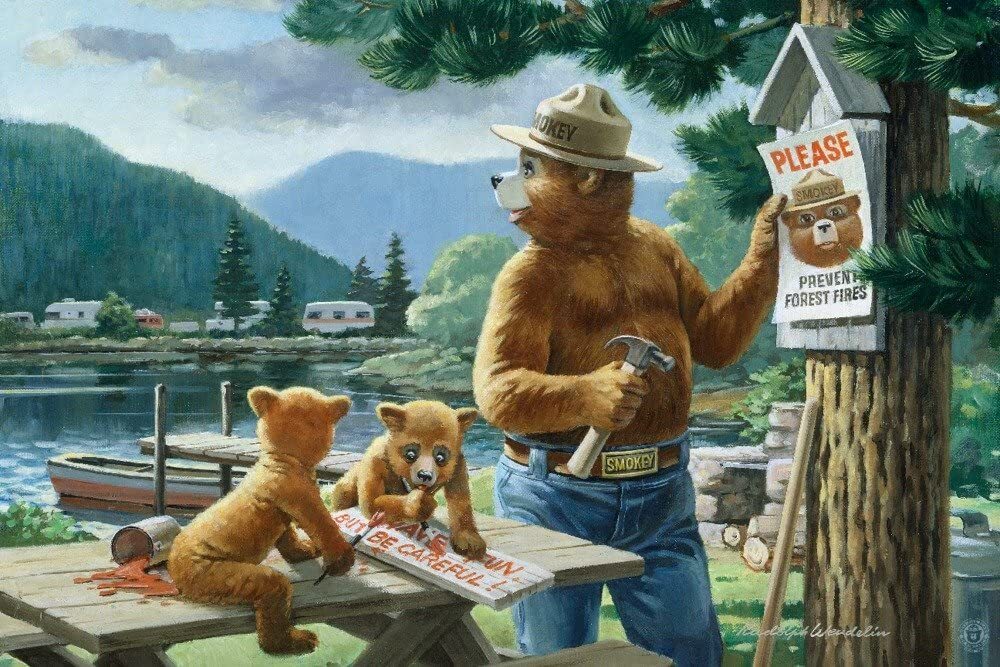Insights
Smokey Bear Isn’t the Harmless Friend We Thought.

Photo Credit: Lantern Press
Environmental communications have changed a great deal over the last hundred years. In 2020—at the height of climate-conscious branding—major companies like Patagonia, Fat Tire, and Allbirds have made environmentally-friendly products and public service announcements a cornerstone of their appeal. The notion of consumer responsibility was born in part from 70 years of environmental PSA campaigns. They persuaded many Americans that individuals are responsible for furthering conservation efforts and slowing environmental degradation. But the campaigns that cultivated our modern sustainability-focused culture have their roots in misunderstanding or outright deception. These PSAs were often paid for by organizations that did not want to bear financial responsibility for their environmentally-damaging actions.
The Litterbug Myth
Some of the most famous “environmental” campaigns were actually created and paid for by corporations in an effort to shift environmental responsibility onto consumers. Keep America Beautiful, a massively successful anti-littering campaign, was actually the brainchild of beverage and packaging companies. The campaign’s famous “Crying Indian” commercial (problematic for multiple reasons) focuses on the consequences of littering, closing with the rousing words, “people start pollution; people can stop it.” The PSA shifts the blame for pollution from corporations. The anti-littering campaign grew into more than just an advertisement—it inspired slogans, nonprofit organizations, and an entire attitude towards environmentalism, where everyday people were responsible for litter, rising emissions, and more.
Smokey the Bear is Cancelled
Smokey the Bear, the mascot of the longest-running PSA campaign in America's history, is also not without his faults. Smokey’s PSAs have a clear message: all fire is bad and the only way to stop uncontrolled fires is through constant vigilance. The campaign reflected the dominant wisdom of its time, but in reality, fire is a natural part of the life cycle of a forest and prevents uncontrollable conflagrations, like those that recently ravaged California. This isn’t new information: Native Americans have used controlled burns for millennia. Government authorities are coming under increasing scrutiny about promoting this blanket anti-forest-fire message.
The campaign is too successful for its own good; Smokey created a nationwide aversion to forest fires of any scale, regardless of their purpose. As a result, local communities and firefighters are hesitant to do controlled burns—the practice goes against everything these PSAs taught us about forest fires.
Recycling Old Tricks
In 1990, the Washington Post advocated on behalf of the plastic industry, reporting on promises made by groups such as the Council for Solid Waste Solutions (a group founded by and for the industry) to make plastic “the most recycled material… by the year 2000.” This was the beginning of a public relations campaign funded and designed by members of the oil, gas, and plastics industry. The goal was to soothe public anxiety surrounding plastic use by espousing the power and potential of recycling through media outreach and strategic advertising.
Thirty years later, we now know less than 10% of plastic has ever been recycled and, more concerning, that the architects of the campaign knew their lofty goals couldn’t be met. NPR and PBS found that the plastic industry “sold the public on an idea it knew wouldn't work—that the majority of plastic could be, and would be, recycled—all while making billions of dollars selling the world new plastic.”
The Takeaway
All three of these campaigns led to widespread, problematic assumptions, and shifted accountability away from the organizations paying for them. Case in point: 100 companies are responsible for more than 70% of all greenhouse gas emissions, yet many environmentalists would argue that efforts to address climate change have long had a disproportionate focus on consumers. Today, consumers are encouraged to buy hybrid and electric cars, compost and recycle, and conserve water and electricity—the same cannot be said for massive corporate consumers and polluters.
This isn’t to say that consumers don’t have a role to play in solving climate change, but it’s misleading to suggest they can do it alone. Climate change, like any global or national issue, is complex and requires buy-in and participation from every level of society. Communicators are often responsible for getting that broad buy-in from the general public.
However, it is equally important for the communicators garnering public buy-in to get the facts straight and be honest about their efforts before they launch a campaign. The lessons from these case studies are simple: do your homework beforehand to ensure that you are stating facts, not misleading the public; give credit and blame where they’re due; and always be cognizant of the potential impact your words could have. It’s only through these strategies that you can build campaigns that do not look regrettable or misguided decades down the line.